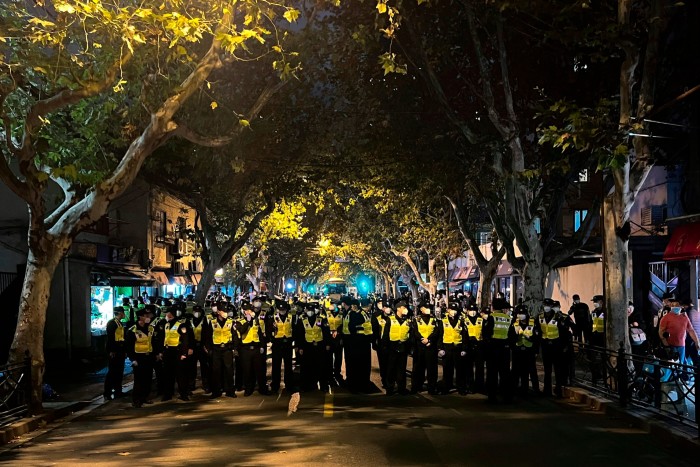By the time dusk had fallen on Wulumuqi Road on Sunday evening, one of the most striking scenes of civil disobedience in mainland China in recent decades was under way.
Onlookers described the gathering, at a busy crossroads in central Shanghai near to where a vigil to the victims of a fire in western China had taken place a day earlier, as unlike anything they had witnessed before.
Many hundreds of people were congregated at any given point, with more stopping to watch or to walk by, flanked by hundreds of police officers. For several hours, officers struggled to contain a spontaneous expression of defiance over both the government’s coronavirus policies and its wider authority that was mostly peaceful, but frequently threatened to boil over.
“We want everyone to hear our voice”, said one young man in attendance, who said the Covid policies were “not scientific”.
The gathering formed part of a nationwide wave of discontent against China’s strict “zero-Covid” policies, which have been energised by the growing sense of anger over the death of 10 people during a fire in the locked-down city of Urumqi on Thursday. The tragedy, which the vigil on Saturday was marking, has been widely blamed on the restrictions, which authorities have denied.
As well as Shanghai, vigils were also held at universities in Nanjing and Wuhan, while there was also signs of growing discontent at Tsinghua university in Beijing on Sunday, where students held a peaceful protest against the government’s coronavirus policies.
Some of the protesters in Shanghai on Sunday held up sheets of white paper on which nothing was written, a reference to the censorship that is a frequent occurrence online in China. When several sheets floated to the ground from a nearby building, the crowd let out a roar of approval and burst into applause.
Complaints over the government’s zero-Covid approach, which resulted in a two-month lockdown of China’s largest city earlier in the year, were bound up with simmering frustrations over the wider political environment and a sense of diminished freedoms.
“The whole system, the whole regime, is not correct,” said one young protester, who like others declined to give his name. He added that the last two to three years of Covid was “just a fuse”.
Those who took part in the Saturday evening vigil were dispersed by the police by the early hours. By Sunday afternoon, however, a large crowd had gathered at the crossroads but were later dispersed further along the Wulumuqi road which was then cordoned off by a hastily assembled blockade and rows of police officers.
Most were not actively protesting, and had instead gathered to observe. But the crowd was occasionally set off by individual incidents. One man pinned a white piece of paper through a twig on a tree. When a police officer ripped it down, people clashed with other officers for several minutes and panic surged across nearby groups before soon subsiding.
On other occasions, people screamed “release them” when people were dragged from the scene or bundled into nearby police vans. Others waited on the edges, trying to avoid trouble. Some carried white flowers — a symbol of mourning in China, bundles of which were removed by police from the original site down the road to the sound of jeers.
One woman in attendance said that “even people who supported the [zero-Covid] policies have started to recognise something is wrong”.
She said she had attended another protest with her parents in 1989, 33 years ago, when she was just seven years old. She was referring to the Tiananmen Square protests in Beijing, which were echoed across cities nationwide, but did not say the name out loud.
“That had an impact on my whole life,” she said. “Now my daughter is seven and I don’t dare bring her here. I don’t know what might happen,” she added.
Separately, down the street and seemingly unrelated to the gathering, there were signs of the pulsating anger bubbling elsewhere across China. One man at a PCR testing site aggressively hurled a woman in a hazmat suit to the ground. She lay motionless for a time before eventually being helped up.
As the gathering wore on into the evening, occasionally breaking out into shouts and clashes, traffic continued to pass the scene and ordinary life occasionally interjected itself. At one point a truck stopped to collect the rubbish from nearby bins.
The gathering appeared to lose momentum around midnight local time on Sunday, according to one person who was at the site.
Although thousands of people are likely to have passed or attended the protest, the number are small relative to the size of the city.
Yet in mainland China, the very sight of open protests against police and the government in such a public venue is rare and significant, and images circulated explosively online despite rapid censorship.
As small numbers of people were taken away by police, the vast majority remained, quietly observing the scene from the sidelines, eager to see what would happen next.
“We have families, we have jobs, we don’t dare to step forward,” the woman said. “But at least we know what is right and we know who we should support”.
“Watching is a kind of support,” she said.

